- Home
- Richard F. Weyand
QUANT (COLONY Book 1)
QUANT (COLONY Book 1) Read online
Books in the EMPIRE Series
by Richard F. Weyand:
EMPIRE: Reformer
EMPIRE: Usurper
EMPIRE: Tyrant
EMPIRE: Commander
EMPIRE: Warlord
EMPIRE: Conqueror
by Stephanie Osborn:
EMPIRE: Imperial Police
EMPIRE: Imperial Detective
EMPIRE: Imperial Inspector
by Richard F. Weyand:
EMPIRE: Intervention
EMPIRE: Investigation
EMPIRE: Succession
EMPIRE: Renewal
EMPIRE: Resistance
EMPIRE: Resurgence
Books in the Childers Universe
by Richard F. Weyand:
Childers
Childers: Absurd Proposals
Galactic Mail: Revolution
A Charter For The Commonwealth
Campbell: The Problem With Bliss
by Stephanie Osborn:
Campbell: The Sigurdsen Incident
QUANT
A Colony Story
by
RICHARD F. WEYAND
Copyright 2021 by Richard F. Weyand
All Rights Reserved
ISBN 978-1-954903-01-2
Printed in the United States of America
Cover Credits
Cover Art: Paola Giari and Luca Oleastri,
www.rotwangstudio.com
Back Cover Photo: Oleg Volk
Published by Weyand Associates, Inc.
Bloomington, Indiana, USA
July 2021
CONTENTS
The Industrialist And The Entrepreneur
Metafactories
Artificial Intelligence, Sort Of
The Plan Tightens Up
Construction And Financing
Problems And Solutions
Major New Direction
Preparations For Launch
Launch
On To The Actual Problem
Arrival And Replication
Assembling The Probe
Testing
Interstellar
Back To Work
The Planet Problem
A Potential Problem
The Lottery
Entering The Lottery
More Ideas
Quiet Progress
Lottery Winners
Education And Training
Getting Closer
Assets
Incentives
Little Surprises
Fine Tuning
Quant’s Plan
Gathering
Livestock
To Orbit
Away And Disaster
Epilogue
Author’s Afterword
The Industrialist And The Entrepreneur
“So he took the meeting?” Anna Glenn asked.
“Yes,” Bernd Decker said, as he continued to pack his overnight bag.
“Did you tell him why you wanted to see him?”
“No.”
“Why would he take the meeting with no topic or agenda?” Glenn asked. “Such an important man, and he just says ‘Sure’?”
“Well, I’m not exactly a nobody. But I think he’s curious.”
“Huh. Well, obviously it worked. You gonna lay the whole thing out? Your whole plan?”
“Yes,” Decker said. “Whether he and I tell anyone else what we’re really up to or not is sort of up in the air.”
“And you’re planning on staying overnight?”
“Not planning on it, but I want to be ready for it. If he bites, I may be there a while.”
“All right,” Glenn said. “Well, good luck.”
“Thanks,” Decker said.
Decker gave his wife a quick peck and then headed out of their condo to the elevator, to the autodrone pad on the roof.
Theodore Burke looked out over the lunar valley through the picture window in his office. Not a valley per se, it was actually a mare, the crater from a long-ago asteroid.
Across the valley floor, more than a dozen large installations labored away at making the materials humanity needed. Not finished goods. Those were manufactured on Earth. No, the lunar facilities were heavy industry. Mining and smelting of iron and aluminum, the manufacturing of steel, the processing of rare earths. Those were the energy-intensive and polluting industries that were gradually being moved off the Earth to the lunar surface.
There was no issue with pollution on the Moon. What was air pollution on Earth was a temporary annoyance on the Moon. The Moon could not hold an atmosphere, and the noxious emissions of these facilities were swept away by the solar wind. What was water pollution on Earth was simply piles of debris on the Moon. Without an atmosphere and its attendant rains, the poisonous by-products of industrialization sat inertly in slowly growing mounds piled up against the crater walls miles distant.
The lunar industrial facilities were actually dark factories. Assembled in Earth orbit and shipped to the Moon at incredible expense, they ran themselves. After the initial expeditions to start them up, they operated without any humans on-site. Their product was pushed out of the Moon’s gravity well by electromagnetic rail guns, to begin its long slow drop toward Earth.
Mankind itself, though, was still largely confined to the surface of the Earth. In the nearly two and a half centuries since mankind had first set foot on the Moon, that was still about as far as it had gotten. Even intra-system distances were so large, and the energy expenditure required to move fragile humans and all their attendant support – air, food, water – made even trips to the Moon incredibly expensive.
Burke sighed. Mankind was, and always had been, in an incredibly perilous situation. The universe was dominated by huge masses and forces. Stars and galaxies and black holes. Huge gravitational fields. Gamma ray bursts that would fry entire planets hundreds of light-years distant. And fragile humanity still clung to a thin shell of ecosystem around a smallish rock balanced between forces and energies that could destroy it all in a single day at any time. Any time at all.
Burke switched the window back to the view of his estate, a sprawling expanse of woods and mountains in eastern Washington, an administrative region in west-central North America.
Enough daydreaming. It was depressing, anyway.
Back to work.
In addition to the normal financial reports and communications from the CEOs and general managers of his companies and divisions, today Burke had a rare in-person meeting. Most business meetings were handled virtually, and that had been the standard for a couple of hundred years. That was what allowed Burke to live in his mountain retreat while running his far-flung businesses. He had never met most of his direct reports.
Of course, he had his own autodrone for traveling. It was comfortable to a distance of a thousand miles or so. For longer than that, he took a suborbital ballistic out of Seattle, which only took a few hours to get to anywhere else on the planet. Most of his needs for food and supplies were met by deliveries by autodrone, and a small staff ran the house. His wife Martha Stern traveled more – she was away now, in fact – often with her friends. Burke was more of a loner, and something of a workaholic.
Still, an in-person meeting was something of a treat.
Burke’s appointment today was with Bernd Decker. Decker was a computer software innovator and executive. He had made a fortune with several successive startups, spinning up a good idea and then selling it off, keeping a part of the stock in each of the transactions. Most had done very well, and Decker had done very well indeed. At such a young age – Decker was thirty-four – it was a tremendous accomplishment.
Part of the reason Burke had taken the in-person meeting – on which Decker had insisted – is that
Burke had absolutely no idea what Decker wanted to talk to him about. Most of Burke’s meetings were drearily predictable, and this one wasn’t. At all.
Burke’s curiosity had overcome his natural tendency to reject meetings for which no agenda was forthcoming, and he looked forward to meeting Decker.
Decker was at that moment in a rented autodrone heading east from Seattle, the big port city that was the administrative center of Washington. It was a couple of hours out to Burke’s estate, and he spent the time reviewing what he knew about Burke.
It was Burke’s father who had been the big push behind moving his heavy industry to the Moon. They weren’t the only big manufacturing industries there now, but Burke’s father had been first. He had been a true visionary.
That effort had taken almost half a century, and the insane expense of it had almost bankrupted the elder Burke a couple of times. He had pressed on, and so had the younger Burke after health issues had forced his father to step down from the day-to-day management of their multiple companies. Ultimately, the whole thing had paid off handsomely.
The younger Burke was now in his early sixties. But he had persisted in carrying out his father’s long-range project. It was that ability to initiate and carry through on long, multi-generation projects that interested Decker in the Burke family.
He was counting on it.
His review complete, Decker settled back to enjoy the view as the autodrone flew through the passes in the mountains, seeking out the denser air at the lower altitudes. It was a much different world than the hustle and bustle of Seattle.
Seattle had been rebuilt after the city, along with Portland and Vancouver, had been largely destroyed in the big Cascadia Quake of 2158. The excellent harbor was just too useful to abandon the site, even with the volcano of Mt. Rainier on one side and the Cascadia Fault on the other. The city had built back better, without all the unreinforced masonry buildings that had doomed the old city. While they were at it, they had built huge channels and walls to steer the lahars that would be the natural result of a Rainier eruption.
As the largest city on the northwest coast of North America, Seattle had been the natural choice for the administrative capital of Washington after the Great Restructuring of 2087, which had reorganized North America into ten administrative regions. Its status as a government center was another spur to the rebuilding of the city after the quake seventy years later. Seattle now, in 2224, was a bustling modern metropolis.
So this wild mountainous terrain was a big change of pace for Decker, and he enjoyed rubbernecking the rest of the way to Burke’s retreat.
Burke stood inside the heavy glass door watching the autodrone come in for a landing on the dronepad that doubled as a terrace. When the drone shut down, he walked out onto the terrace. Decker got out of the machine.
“Mr. Decker, I presume,” Burke said.
“Yes. Hello, Mr. Burke. Thank you for meeting with me,” Decker said as he walked up.
The two tapped forearms, making an ‘X’, in the common greeting. Decker had read that people used to shake hands before that was determined to be a major disease vector. Such a thing now was unthinkable. Customs had changed.
“Come along in, Mr. Decker,” Burke said, showing the younger man into his office, adjacent to the terrace and looking out over the defile below.
“Please, call me Bernd.”
“And you should call me Ted.”
Burke waved Decker to the seating arrangement by the windows and they sat. The housekeeper had set out cookies and drinks on the coffee table.
“So, Bernd, I am more than a little curious about what would bring you all the way out here for an in-person meeting. We are not involved in the same sort of business, after all. It was curiosity more than anything that pushed me to take this meeting.”
“I was hoping it would. I have something of a proposal for you, Ted, but I would like to set the background a bit first, if I could.”
Burke waved his hand to proceed.
“It was almost seventy years ago that your father started the push to move heavy industrial processes to the Moon. It took nearly half a century to accomplish, but he was proven right. I propose a project on a much larger scale.”
Burke’s eyebrows went up, but Decker merely nodded.
“The total population of the Earth right now is a bit over four billion people. Increasing prosperity resulted in lower birth rates, and the population gradually declined to four billion from its peak of ten billion, and has held there now for a century or more. Power from nuclear fusion, recycling raw materials, and moving much of the heavy industry to the Moon have resulted in much lower pollution and a much higher standard of living in kilowatt-hours per year per capita.
“The Earth has become a very nice place to live. There is plenty for everyone to live in comfort. And that creates a serious problem.”
“It does?” Burke asked.
“Yes. No one is willing to go exploring. Or, rather, no one is being pushed by the drudge and difficulty of their daily existence to go off exploring for something better. Or working at finding the means.
“At the same time, Ted, you and I both know this is an illusion. Humanity has lived a charmed life so far. We are now, and have always been, subject to being wiped out as a race by one errant asteroid or a random hit from a local gamma ray burst.
“Meanwhile, our engineers and scientists work on the latest consumer gadget. Our best minds are not working on our biggest problem.”
“And that is?” Burke asked.
“Getting off this one planet. Spreading humanity out so it’s immune to racial extinction events. It’s a huge problem. I’m not saying it isn’t. We know solar-system exploration is a dead-end. There is no place in the solar system where man can live without creating and maintaining his own artificial environment. On the long term, that’s untenable as a racial survival solution.
“And interstellar travel is a bigger problem yet. We don’t even know if that one is solvable. And we never will, because we’re not working on it.”
Burke was surprised that Decker so succinctly summed up his own thoughts of earlier this morning.
“What’s to be done then, Bernd?” Becker asked.
“The computer industry is on the verge of achieving the next level of artificial intelligence.”
Burke snorted.
“There’s no such thing as artificial intelligence,” he said. “At least not in terms of a self-dispatching, self-actualized machine. And there never will be. That’s been proven, I think.”
“Yes, it has. What we manage to achieve with each new generation of software is to move the human-provided goals of the machine to another, higher level of abstraction.”
“And you’re going to do that again with this new generation?”
“Yes,” Decker said. “So what if we told a computer to figure out how to get man off the planet? To spread the human race out, against the possibility of an extinction event? Made that its overriding goal?”
“Well, you can do that yourself, without me. But that still leaves you with an insurmountable problem.”
Decker was nodding.
“Yes, of course. We wouldn’t build interstellar ships even if we knew how.”
“Right,” Burke said. “If there’s no motivation to look into it, there’s no motivation to build them either. So how do you get around that?”
“That’s where you come in, Ted. We put that computer on a metafactory – a factory that can reproduce itself – and send it off to the asteroids. When the computer solves the problem of interstellar flight, it and its child-factories build the ships. Getting people willing to leave will still be an issue, but we can get that far, at least.”
Burke sat back in his chair and considered. Decker seemed content to wait. He helped himself to several cookies and a cup of hot chocolate while Burke thought it through.
Factories that could build factories was a problem. His factories produced refined metals and othe
r raw materials, not finished products. They would have to bring other people in. Probably several others.
And they would need a cover story. Saving humanity was not the sort of thing investors went in for. Now, if you had a whiz-bang new widget that everybody wanted, that would be different.
The other issue was with security.
“What’s the cover story?” Burke asked.
“Cover story?”
“Yes. What do we tell investors this is for? We’re going to spend x-ty bazillion dollars on this thing. What’s the reason? Something investors will say, ‘Oh. OK.’ Saving humanity won’t move them. That’s a shorthand way of saying ‘Let’s lose a lot of money in a hurry.’”
“OK. Consider this. We will have these factories making things and shipping them to Earth. No gravity well to lift them out of, just get them started toward Earth orbit at the right time and angle. And the output will continue to rise as more factories are made, without any further investment, because the factories make themselves. That’s the critical point.”
“OK. I can sell that. That’s an easy one. One last issue. The security issue. How do you keep people from hacking into the computer and changing its programming? Bending its purpose? Making it do something evil? Shove entire asteroids toward Earth at the wrong angle, for instance. Any login can be hacked, especially over the timeframes we’re talking about. All you really need to do is bribe somebody who has the login.”
“I don’t intend to give it a login,” Decker said.
“You intend to send out a computer with its own factories, to make whatever it wants, and not give it a login?”
“That’s right.”
“How do you stop it from making some colossal blunder?” Burke asked. “‘Get humanity off the Earth’ sounds like a great goal until the computer figures out it can easily do that by simply exterminating everyone.”
“Well, I didn’t say one didn’t have to be careful, Ted. But against the certainty of any user login being hacked and derailing the project, the simplest thing is not to include one.”

 EMPIRE: Succession
EMPIRE: Succession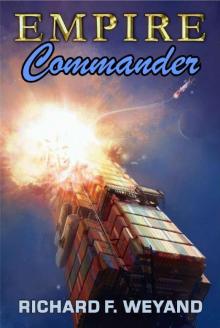 Commander
Commander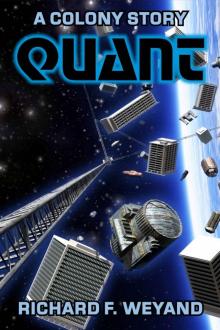 QUANT (COLONY Book 1)
QUANT (COLONY Book 1) EMPIRE: Renewal
EMPIRE: Renewal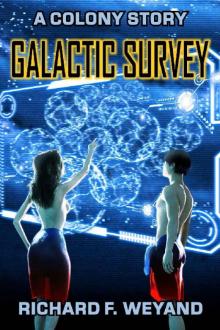 GALACTIC SURVEY (COLONY Book 3)
GALACTIC SURVEY (COLONY Book 3) Campbell- The Problem With Bliss
Campbell- The Problem With Bliss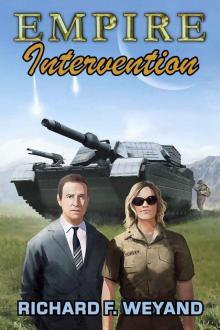 EMPIRE: Intervention (EMPIRE SERIES Book 13)
EMPIRE: Intervention (EMPIRE SERIES Book 13)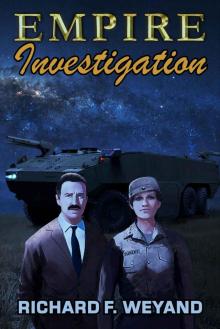 EMPIRE: Investigation
EMPIRE: Investigation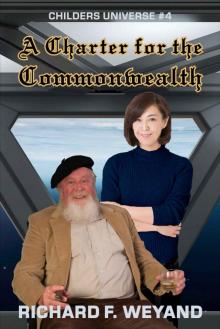 A Charter for the Commonwealth
A Charter for the Commonwealth EMPIRE: Resistance
EMPIRE: Resistance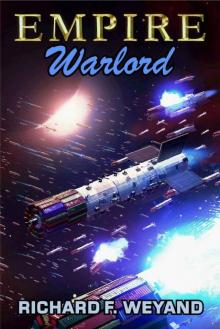 EMPIRE: Warlord (EMPIRE SERIES Book 5)
EMPIRE: Warlord (EMPIRE SERIES Book 5) EMPIRE: Resurgence
EMPIRE: Resurgence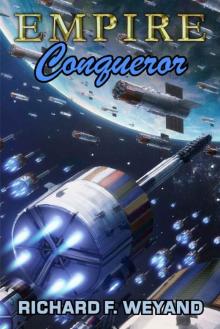 EMPIRE: Conqueror (EMPIRE SERIES Book 6)
EMPIRE: Conqueror (EMPIRE SERIES Book 6) Tyrant
Tyrant Usurper
Usurper Galactic Mail: Revolution! (Childers Universe Book 3)
Galactic Mail: Revolution! (Childers Universe Book 3) Galactic Mail_Revolution!
Galactic Mail_Revolution! Childers
Childers CHILDERS_Absurd Proposals
CHILDERS_Absurd Proposals